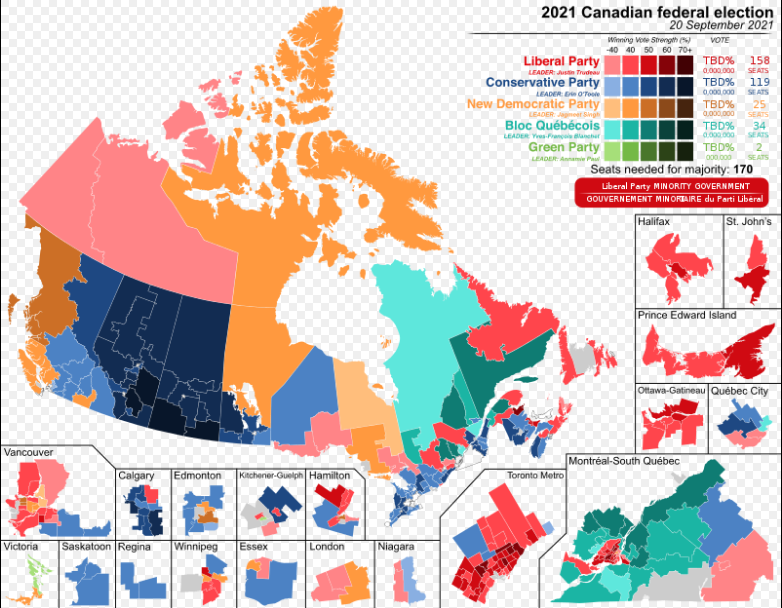Poilievre Loses: Implications For Canada's Conservative Party

Table of Contents
Damage Control and Internal Party Divisions
Poilievre's defeat reveals deep-seated divisions within the CPC, threatening the party's unity and its ability to present a cohesive front to Canadian voters.
Fractured Base
The results exposed a fractured voter base, highlighting significant policy disagreements and regional disparities.
- Social vs. Fiscal Conservatism: Poilievre's platform, while appealing to a strong segment of socially conservative voters, alienated some fiscal conservatives who found his approach too populist. This internal conflict hampered the party's ability to attract a broader coalition.
- Regional Disparities: Support for Poilievre varied significantly across Canada, with stronger support in certain provinces and weaker support in others. This geographical division highlights the challenge of building a national consensus within the CPC.
- Generational Divide: Analysis suggests a generational divide in support, with younger voters less receptive to Poilievre's message compared to older, more traditional conservatives. This signals a need for the party to adapt its messaging to resonate with a wider demographic.
The potential for further internal conflict and power struggles is significant. The loss could trigger a period of intense infighting and uncertainty, further weakening the party's image and hindering its ability to effectively challenge the Liberal government.
Leadership Challenges
Poilievre's loss inevitably raises questions about his continued leadership. A leadership review or challenge is a distinct possibility, potentially leading to significant changes within the party.
- Potential Candidates: Several prominent figures within the CPC could emerge as potential leadership candidates. Their platforms and approaches would likely differ from Poilievre's, potentially leading to shifts in the party's overall direction.
- Policy Shifts: A new leader could bring about significant policy changes, attempting to broaden the party's appeal and address the issues that contributed to Poilievre's defeat. This could involve revisiting key policy positions on issues like climate change, social programs, and economic policy.
- Impact on Party Unity: The leadership transition itself could further exacerbate internal divisions, particularly if the process is contentious. However, a successful, unifying leadership change could potentially heal the wounds and rebuild party morale.
Re-evaluating the Party's Platform and Messaging
Poilievre's loss necessitates a thorough review of the CPC's platform and communication strategies. The party must identify where its message resonated and where it fell flat.
Policy Review
A critical examination of Poilievre's platform is essential.
- Economic Policies: While some of Poilievre's economic proposals, such as his focus on lower taxes and reduced government spending, found resonance with segments of the electorate, others may have alienated potential supporters. A reassessment is crucial to strike a balance.
- Social Policies: Poilievre's stance on social issues, such as abortion and LGBTQ+ rights, may have alienated moderate voters. The party needs to carefully consider how to navigate these issues while maintaining its core values.
- Areas for Improvement: The party must identify areas of weakness in its platform and develop more effective strategies to address pressing issues facing Canadians, such as affordability, healthcare, and climate change.
Communication Strategy
The CPC's communication and outreach efforts during the [specify context, e.g., leadership race/election] were subject to criticism.
- Communication Failures: The party needs to analyze potential communication failures, such as ineffective messaging or a lack of engagement with key demographics.
- Improving Messaging: A revamped communication strategy should focus on clearer, more inclusive messaging that resonates with a broader range of Canadians. This includes diversifying its media outreach and actively engaging with social media.
- Social and Traditional Media: The CPC must optimize its use of both social media and traditional media to reach different segments of the population effectively.
Impact on Future Elections and the Canadian Political Landscape
Poilievre's defeat significantly impacts the CPC's electoral prospects and the broader Canadian political landscape.
Electoral Prospects
The loss casts a shadow over the CPC's chances in the next federal election.
- Seat Projections: The results suggest a potential decline in seat projections for the Conservatives, making a majority government more challenging to achieve.
- Shift in Voter Support: Poilievre's loss could lead to a shift in voter support towards other parties, such as the Liberals or the NDP, depending on how the CPC responds to this setback.
Shift in the Political Balance
The defeat could reshape the broader Canadian political landscape.
- Increased Influence of Other Parties: The weakened CPC could empower other parties, potentially leading to shifts in government policy and priorities.
- Changes in Government Policy: The Liberals may be emboldened to pursue their agenda with less resistance from a divided Conservative opposition.
- Inter-party Dynamics: The outcome could significantly influence inter-party dynamics and the potential for future coalitions or minority governments.
Conclusion
Poilievre's loss marks a pivotal moment for the Conservative Party of Canada. The key implications include deep internal divisions, the urgent need for a comprehensive review of its platform and communication strategies, and a significant impact on its future electoral prospects and the broader Canadian political landscape. Understanding these implications – analyzing the internal divisions, evaluating the messaging strategy, and assessing the future electoral prospects – is crucial for the party's ability to regain its footing and compete effectively in the future. Further analysis is needed to determine the true long-term impact of Poilievre's loss on Canadian politics. The future of the CPC hinges on its ability to address these challenges and rebuild its image as a viable alternative government.

Featured Posts
-
 Pacers Vs Cavs Comprehensive Guide To Game Schedule Viewing Options And Match Predictions
Apr 30, 2025
Pacers Vs Cavs Comprehensive Guide To Game Schedule Viewing Options And Match Predictions
Apr 30, 2025 -
 Suspect In Charlotte Mothers Death Faces Jury Selection
Apr 30, 2025
Suspect In Charlotte Mothers Death Faces Jury Selection
Apr 30, 2025 -
 Federal Election And The Canadian Dollar A Potential Decline
Apr 30, 2025
Federal Election And The Canadian Dollar A Potential Decline
Apr 30, 2025 -
 The 5 Best Family Cruise Lines A Tpg Guide
Apr 30, 2025
The 5 Best Family Cruise Lines A Tpg Guide
Apr 30, 2025 -
 Congressional Address Assessing President Trumps Early Actions
Apr 30, 2025
Congressional Address Assessing President Trumps Early Actions
Apr 30, 2025
